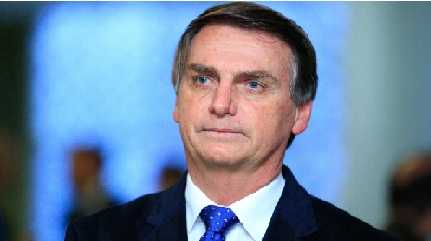
SAO PAULO (AP) — A panel of judges voted Friday to render far-right former Brazilian President Jair Bolsonaro ineligible to run for office again after concluding that he abused his power and cast unfounded doubts on the country’s electronic voting system.
The decision, once all judges have voted, will forbid Bolsonaro from running until 2030, upending the 68-year-old’s political future and likely erasing any chance for him to regain power.
Four of the seven judges on the nation’s highest electoral court agreed that Bolsonaro abused his authority by using government communication channels to promote his campaign and sowing doubts about the vote. One judge voted against, and two judges had yet to vote.
“This decision will end Bolsonaro’s chances of being president again, and he knows it,” said Carlos Melo, a political science professor at Insper University in Sao Paulo. “After this, he will try to stay out of jail, elect some of his allies to keep his political capital, but it is very unlikely he will ever return to the presidency.”
The case focused on a July 18, 2022, meeting where Bolsonaro used government staffers, the state television channel and the presidential palace in Brasilia to tell foreign ambassadors that the country’s electronic voting system was rigged.
In her decisive vote, judge Carmen Lucia — who is also a Supreme Court justice — said “the facts are incontrovertible.”
“The meeting did take place. It was convened by the then-president. Its content is available. It was examined by everyone, and there was never a denial that it did happen,” she said.
Bolsonaro can appeal to the Supreme Court. He also faces other legal troubles, including criminal investigations.
Speaking Thursday to reporters in Brasilia, Bolsonaro was defiant.
“This is an injustice against me, my God in heaven! Show me something concrete I have done against democracy,” he said. “Perhaps my crime was doing the right thing for four years.”
In an interview earlier this week, Bolsonaro recognized that his chances of prevailing were slim. The ruling will remove him from the 2024 and 2028 municipal elections as well as the 2026 general elections. Future criminal convictions could extend his ban by years and subject him to imprisonment.
Former President Fernando Collor de Mello and current President Luiz Inácio Lula da Silva were declared ineligible in the past, but Bolsonaro’s case marks the first time a president has been suspended for election violations rather than a criminal offense. Brazilian law forbids candidates with criminal sentences from running for office.
Lula’s eligibility was reinstated by Brazil’s top court following rulings that then-judge and now Sen. Sergio Moro was biased when he sentenced the leftist leader to almost 10 years in prison for corruption and money laundering.
Speaking before the court’s vote, lawmaker Carlos Jordy, a staunch Bolsonaro ally, said the former president still expected “a drastic change” from the court. However, Jordy said he was already contemplating a future without Bolsonaro as the standard-bearer of right-wing Brazilian politics.
“Even if they commit this injustice, which has no precedent at the electoral court, Bolsonaro remains Brazil’s biggest political figure,” Jordy said in a phone interview. “There will be some people able to carry his flag.”
Bolsonaro holds a ceremonial leadership role within his Liberal Party and has traveled around Brazil criticizing Lula, who won last October’s election with the narrowest margin in over three decades.
The trial has reenergized Bolsonaro’s base online, with supporters claiming he is a victim of an unfair judicial system and comparing his fate to that of former U.S. President Donald Trump, according to Marie Santini, coordinator of NetLab, a research group at the Federal University of Rio de Janeiro that monitors social media.
However, that engagement pales in comparison to the levels seen ahead of last year’s polarizing election.
This week, his supporters showed their continued support with contributions to help him pay 1.1 million reais (about $230,000) in fines levied by Sao Paulo state’s government for Bolsonaro’s repeated violations of health protocols during the COVID-19 pandemic.
While Bolsonaro aims to be the right’s kingmaker, and his endorsement will carry significant heft, his decision to decamp to Florida for several months at th+e start of Lula’s term weakened him, said Thomas Traumann, a political analyst. That is reflected by the limited right-wing outrage on social media throughout the eligibility trial, and no sign of protests.
“There won’t be a mass movement, because he diminished in size. The fact that he went to Florida and didn’t lead the opposition caused him to diminish in size,” Traumann said. “The leader of the opposition is clearly not Bolsonaro.”




